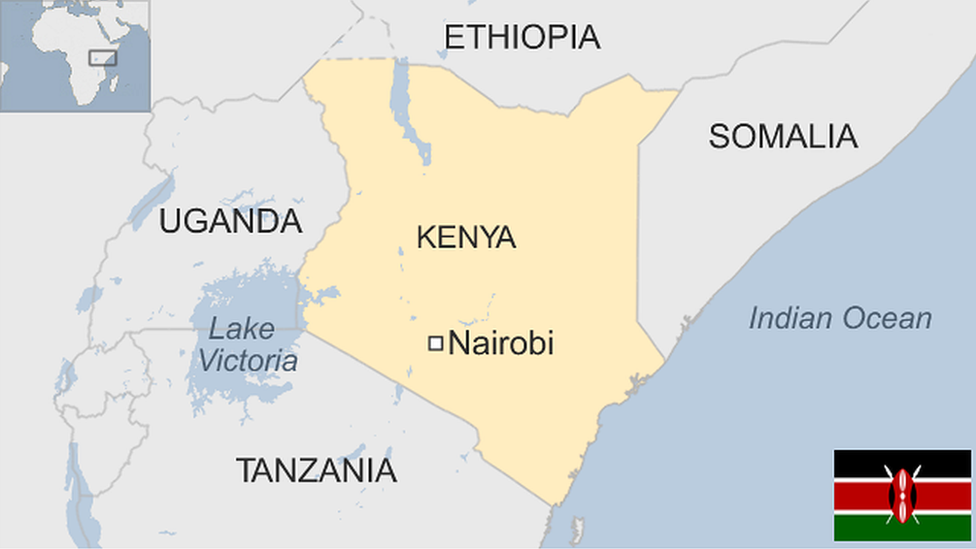Kenyans in fear of police 'death squads'
- Published
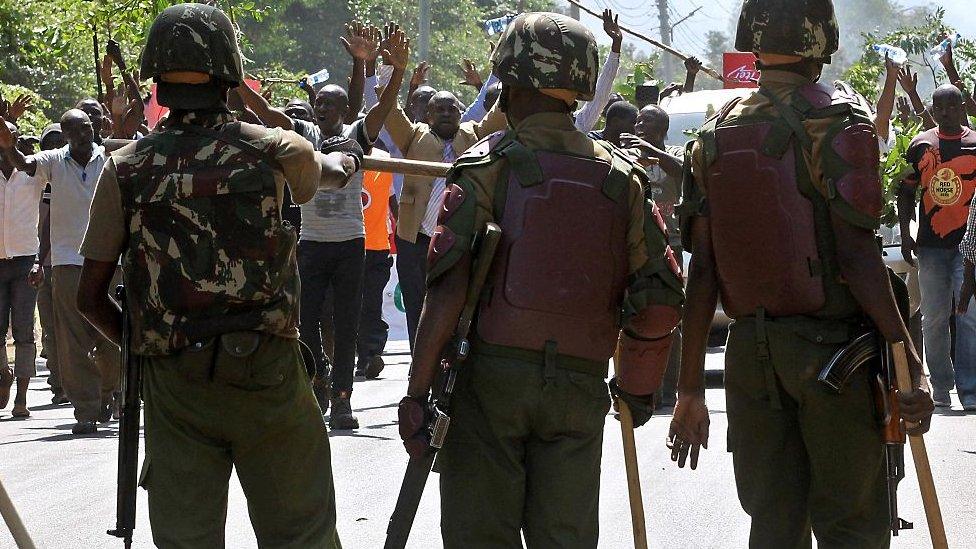
The recent killing of human rights lawyer Willie Kimani and two others has once again put the Kenyan police in the spotlight. The police have been accused of running death squads, a claim they deny. The BBC's Tomi Oladipo investigates the growing public mistrust of the police, especially among young men.
"My friend had gone to bathe in the river when he discovered there was a body in the river so he called me".
Jackson (not his real name) looks out across the Ol Donyo Sabuk River about an hour-and-a-half outside the centre of Nairobi. He and his friends quickly called the police.
It was not the first time they had come across corpses in the river.
This time, however it was a more high-profile case. "Shortly after, we saw a sack floating in the water," he continues.
"We went to look at it and I noticed the outline of a head so we opened the sack."
Days later they found a third body - the three turned to be a missing lawyer, Willie Kimani, his client, Josephat Mwendwa and their taxi driver, Joseph Muiruri.
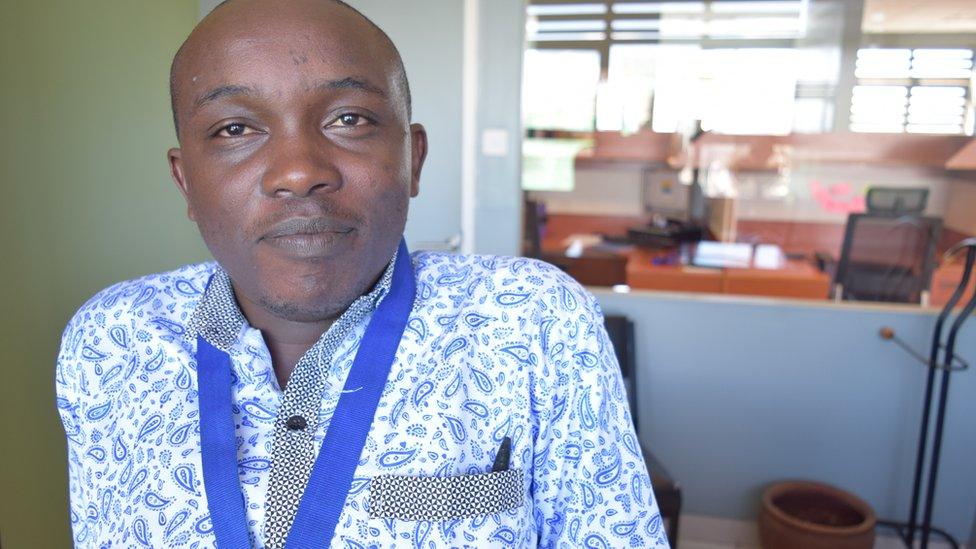
Willie Kimani, 32, went missing shortly after filing a complaint against the police
Post-mortem reports have revealed signs that the men suffered severe torture.
The case sparked nationwide demonstrations, with protestors accusing the police of being behind the killings because Mr Mwendwa had brought a case against an officer.
Campaigners say this highlights a wider trend of unlawful executions by the police. The force has distanced itself from the case of the dead lawyer, describing it as an isolated incident relating to a rogue policeman.
Four officers have been arrested but not charged.
'Crime to be a young man'
In Nairobi's Mathare valley, brown tin roofs are interspersed with electricity and light poles - the lights were set up to help improve security in this notorious slum.
Crime is rife here, fuelled by high unemployment but residents say the police are too heavy-handed in their attempts to maintain order.
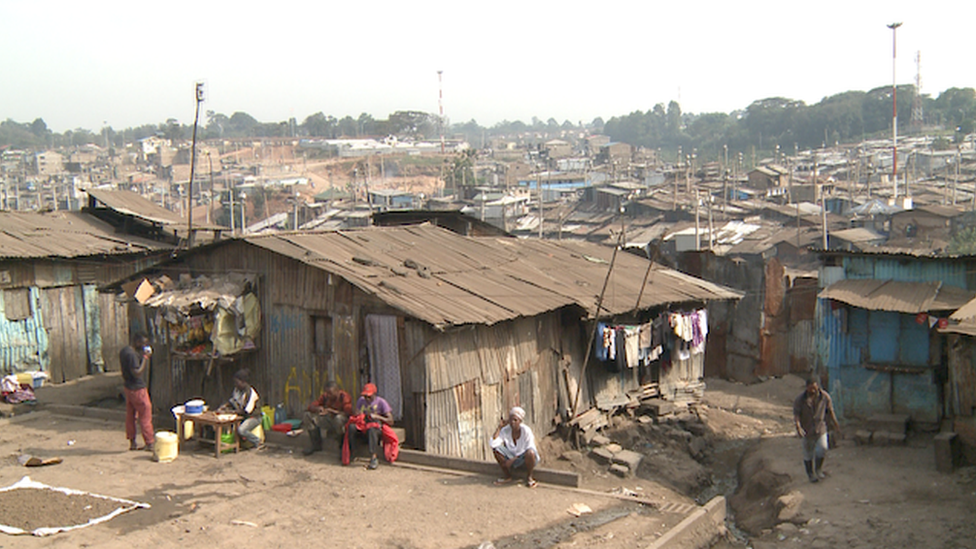
Mathare is notorious for crime
"It's like it's a crime to be a young man here," says Juliet Wanjira. "Stop Police Executions" says the slogan on her T-shirt.
"We are losing our young men," she continues. "We're left with so many wives and mothers looking for their men."
Ms Wanjira is a campaigner with the Mathare Social Justice Centre (MSJC) which has been documenting the cases of young men shot by the police, they say unlawfully.
Anthony Mburu, another campaigner with MSCJ says he once witnessed four teenagers being shot by police officers.
"They were chased by about six policemen. The youths split and ran in different directions but they were each followed by the police," he says.
"One ran to a kiosk and he was shot before he could enter. Another one pleaded for mercy but the police shot him in the stomach. He did not die immediately. As he was struggling for life, the policeman shot him twice."
'Fighting terror with terror'
One mother lost her son also in Mathare last August. She sent her son to check on his brother who was in police custody but she never heard from him again.
After searching for three days, she found his body in a mortuary. Witnesses told her that the police had shot him.
"He was shot in both eyes, in his cheek and the left side of his chest," she told me. "We reported it to the police and to the different agencies but I've not got any help. They tell me they'll get back to me but they don't."
While she has sought justice, others think they will never find it. Another mother who has lost her son in similar circumstances says she did not bother to report her case.
"Here in Kenya, who am I to take the case forward?" she asked. "Look at me. I live in Mathare slum. If big people are killed and their cases just disappear, then what about me? If I speak I'll be killed like a chicken. I've left it all to God."
There have been similar cases reported across the country.
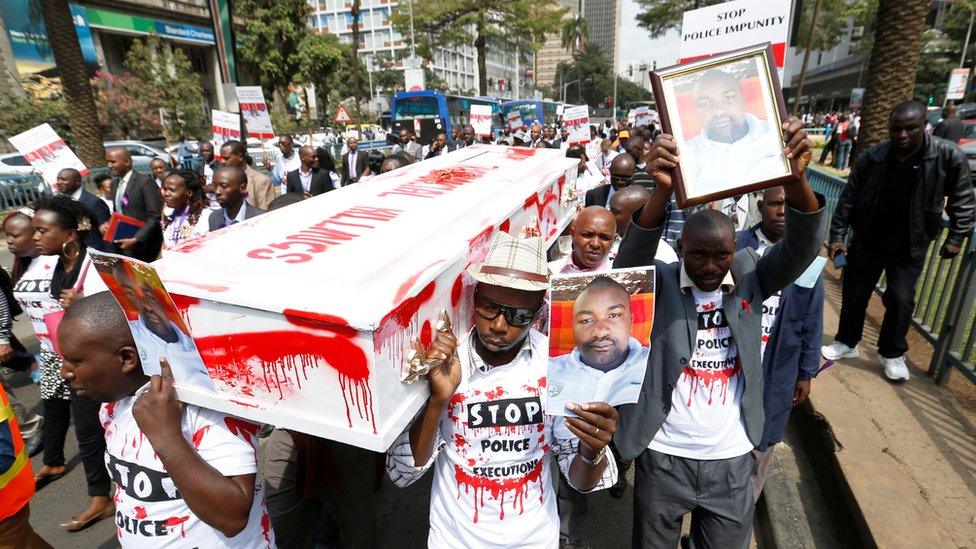
Protestors stained a coffin with red paint to represent fake blood at the rally for human rights lawyer Willie Kimani
The non-governmental watchdog Independent Medico-Legal Unit (IMLU) says the police killed 97 people in 2015 alone.
More recently the group says eight suspected robbers, aged between 15 and 26, were shot at close range in April, either while kneeling or lying on the ground.
Police crackdowns in the fight against Islamist militants have targeted predominantly Muslim communities around the country in the aftermath of major attacks.
Last year, a report by the Kenya's official rights body described it as "fighting terror with terror" and reported 25 killings.
Between 2012 and 2014, three prominent clerics believed to have had links to al-Shabab were killed in the coastal city of Mombasa. Their supporters say police "death squads" killed them.

High-profile extrajudicial killings in Kenya:

Police said about at least 10 bullets were fired at Jacob Juma's Mercedes car
In May 2016 Businessman Jacob Juma was shot dead while driving home. He had been involved in several high-profile legal cases against the government over failed business deals
In October 2013 Muslim cleric Ibrahim "Rogo" Omar was shot dead while driving home. Mr Rogo was alleged to have links with Islamist militants al-Shabab
In August 2012 Muslim cleric Aboud Rogo Mohammed was killed in a drive-by shooting. He was from the same mosque as Mr Omar and was also accused of backing al-Shabab
In March 2009, external human rights activist Oscar Kamau Kingara, who investigated extrajudicial killings, was shot dead in his car as he drove home.

The spokesman for Kenya's Interior Ministry, Mwenda Njoka, told the BBC that the Kenyan government is against extrajudicial killings.
"It is against the law and that's a point we don't need to belabour," he said. "We have a legal mechanism through the Independent Policing Oversight Authority (IPOA) and other legal forums to address legal measures employed by security agents."
The Mathare campaigners say that of the 40 cases reported to IPOA this year, only one has been dealt with.
That adds to the dozens more they say have been unresolved. Kenya's police spokesman Charles Owino dismisses the activists' claims, saying they ignore important facts.
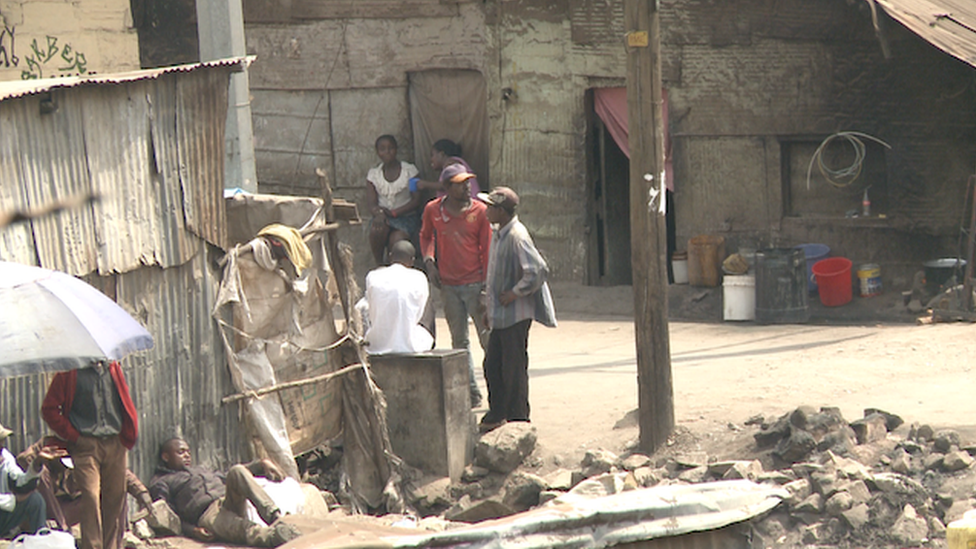
Residents say it's a crime to be a young man in Mathare
"The police are there to protect the common man. So we cannot allow a situation where a group of criminals move around with arms.
"These are the people you want to move around with arms and shoot innocent citizens? And then we say there's no law and order?"
He says there might be rogue elements within the police, who are then charged and punished, but insists that the force generally abides by the rule of law.
Police reforms have been ongoing but even President Uhuru Kenyatta has expressed concerns that the process has been slow.
The perceived culture of police impunity has many worried ahead of next year's elections, often a time of increased violence.
- Published4 July 2023
